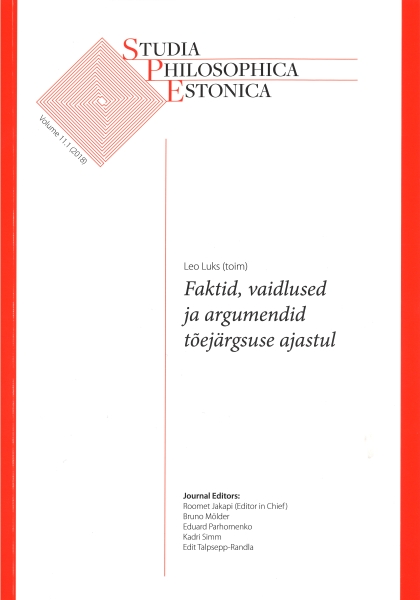Tõejärgsuse näivusest
DOI:
https://doi.org/10.12697/spe.2018.11.1.05Keywords:
tõejärgsus, demokraatia, tõde, ekspertteadmine, post-truth, democracy, truth, expert knowledgeAbstract
Tõejärgsuse mõistet on kasutatud 1992. aastast, kuid avaliku debati teravik suunati nähtusele alles pärast 2016. a Brexiti hääletust ja Donald Trumpi Ameerika Ühendriikide presidendiks valimist. Tõejärgsuse debatis kõneldakse tõest ja teadmistest demokraatia eesmärkide kontekstis. Artikli eesmärgiks on vaadelda, milline on tõe roll demokraatlikus poliitilises valimisdebatis ning näidata, kuidas ekspertteadmine individuaalsete poliitiliste valikute tegemisel ning professionaalses tegevuses, sh teaduses on põhimõtteliselt erinevad.
The concept of post-truth has been used since 1992, but the public debate has been focused on it only after the 2016 Brexit vote and election of Donald Trump as the President of USA. In the post-truth debate people talk of truth and knowledge in the context of the aims of democracy. The purpose of the article is to see what is the role of truth in the election debates in democratic states and to show how expert knowledge in making individual political choices and in professional activities, including science, are in principle different.
References
Achen, C. ja Bartels, L. (2016). Democracy for Realists: Why Elections Do Not Produce Responsive Government, Princeton University Press.
Audickas, L., Hawkins, O. ja Cracknel, R. (2017). UK Election Statistics: 1918-2017, The House of Commons Library. http://researchbriefings.files.parliament.uk/documents/CBP-7529/CBP-7529.pdf
Auseichyk, Y., Gonianakis, K. ja Mets, A. (2017). Aktiivse realismi ideoloogia (intervjuu Hasok Changiga), Sirp 18: 4-6. http://www.sirp.ee/s1-artiklid/c21-teadus/aktiivse-realismi-ideoloog/
Behrens, C. (2017). A call to philosophers: Join the fray, help fix our world, Süddeutsche Zeitung. https://www.worldcrunch.com/opinion-analysis/a-call-to-philosophers-join-the-fray-help-fix-our-world
Brennan, J. (2016). Against Democracy, Princeton University Press, Princeton.
Christiano, T. (2015). Democracy, E. N. Zalta (toim), The Stanford Encyclopedia of Philosophy. https://plato.stanford.edu/archives/spr2015/entries/democracy
Estlund, D. (2003). Why not epistocracy?, N. Reshotko (toim), Desire, Identity and Existence: Essays in honor of T. M. Penner, Academic Printing and Publishing, lk 53-69.
Frankfurt, H. G. (2005). On Bullshit, Princeton University Press, Princeton.
Frankfurt, H. G. (2016). Donald Trump is BS, says expert in BS, Time. http://time.com/4321036/donald-trump-bs/
Glanzberg, M. (2016). Truth, E. N. Zalta (toim), The Stanford Encyclopedia of Philosophy. https://plato.stanford.edu/archives/win2016/entries/truth
Kosinski, M., Matz, S., Gosling, S., Popov, V. ja Stillwell, D. (2015). Facebook as a social science research tool: Opportunities, challenges, ethical considerations and practical guidelines, American Psychologist 70: 543-556.
Kosinski, M., Stillwell, D. ja Graepel, T. (2013). Private traits and attributes are predictable from digital records of human behavior, Proceedings of the National Academy of Sciences PNAS 110: 5802-5805.
Laidre, M. (2017). Eksperdikultus ehk kui Platon olnuks dendroloog, Sirp 38: 40. http://www.sirp.ee/s1-artiklid/c9-sotsiaalia/eksperdikultus-ehk-kui-platon-olnuks-dendroloog/
Matz, S., Kosinski, M., Nave, G. ja Stillwell, D. J. (2017). Psychological targeting as an effective approach to digital mass persuasion, Proceedings of the National Academy of Sciences PNAS 114: 12714-12719.
McCulloch, G. (1985). Labour, the left, and the British general election of 1945, Journal of British Studies, 24: 465-489.
Musschenga, A. W. (2002). Integrity: Personal, professional and moral, A. W. Musschenga (toim), Personal and Moral Identity, Kluwer, Dordrecht.
Polychroniou, C. (2016). Trump in the White House: An interview with Noam Chomsky, Truthout. https://truthout.org/articles/trump-in-the-white-house-an-interview-with-noam-chomsky/
Popper, K. R. (2010). Avatud ühiskond ja selle vaenlased I. Platoni lummuses, Eesti Keele Sihtasutus, Tallinn.
Ramsey, F. P. (2016). Teadmine, Akadeemia 28: 2205-2207.
Schumpeter, J. A. (2002). Kaks demokraatiakontseptsiooni, J. Lipping (toim), Kaasaegne poliitiline filosoofia. Valik esseid, EYS Veljesto Kirjastus, Tartu.
Tesich, S. (1992). A government of lies, The Nation January 6/13: 12-14.
Williams, B. (1993). Who needs ethical knowledge?, Royal Institute of Philosophy Supplement 35: 213-222.
Williams, B. (2005). Truth, politics, and self-deception, In the Beginning Was the Deed, Realism And Moralism In Political Argument, Princeton University Press, Princeton, lk 154-164.





